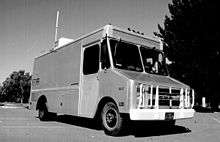Packet Radio Van

The Packet Radio Van was a van refitted by Don Cone at SRI International, and equipped with technology that was used in the first two-way internetworked transmission on August 27, 1976, and the first three-way internetworked transmission on November 22, 1977; the latter of which is considered the start of the Internet.
Background
As part of the DARPA project to connect the disparate computers at its various contractors, there was a push to build a mobile packet radio laboratory to house a node of the early network, partly to simulate the needs of in-the-field military to connect to the network, and partly to test internetworking - connecting different communications protocols via the internet protocol suite.[1]
Equipment
The van, designed by Don Cone, resembled a bread van and contained all of the equipment needed to be an ARPANET node via packet radio, including a DEC LSI-11.[1] Other equipment included a shielded generator, flexible equipment racks, and air conditioning.[2] Due to his contributions around that time, Cone was promoted to Research Engineer.[3]
Transmissions
The first two-network TCP/IP transmission was between the van and ARPANET on August 27, 1976; the van was parked next to Rossotti's (now the Alpine Inn), a well-known Portola Valley, California biker bar, and wires were run to one of the picnic tables.[4] The location was chosen as to be far enough from SRI in Menlo Park, California to be "remote" but close enough to have good radio contact.[1]
This first true Internet transmission occurred on November 22, 1977, when SRI originated the first connection between three disparate networks. Data flowed seamlessly through the mobile van at SRI in Menlo Park, California and the University of Southern California in Los Angeles via London, England, across three types of networks: packet radio, satellite, and the ARPANET.[5]
The van was also the site of the first experiments (primarily by Earl Craighill and Tom Magill) with Voice over IP through ARPA's Network Speech Compression Program around 1977 to 1978. They focused on how to compress speech such that it still sounded "natural" and arrived in a timely manner.[1] The phone in the van was a Mickey Mouse phone.[1]
Legacy
The van itself sat unused for a decade in a back lot on SRI's campus until plans were made to celebrate the 20th anniversary of the internet in 1997 at the Internet Supercomputer Conference in San Jose, California. SRI employees Don Alves and Don Nielson cleaned, relicensed, and replenished the van's radio and internet equipment. The van sat on the convention floor and was popular with attendees; SRI then donated the van to the Computer History Museum rather than let it further deteriorate.[1]
In 2007, the Computer History Museum presented a 30th anniversary celebration of this demonstration, which included several participants from the 1977 event.[6]
See also
References
- 1 2 3 4 5 6 Nielson, Don (February 2002). "The SRI Van and Computer Internetworking" (PDF). CORE. 3 (1). Computer History Museum. pp. 2–7. Retrieved 2013-03-31.
- ↑ Nielson, Don (December 2010). "History Corner: SRI "Internet Van" to Be on Display in Computer History Museum" (PDF). SRI Alumni Association Newsletter. SRI International. p. 6. Retrieved 2013-03-31.
- ↑ "In Memoriam: Virgil Donald "Don" Cone" (PDF). SRI Alumni Association Newsletter. SRI International. August 2011. pp. 11–12. Retrieved 2013-03-31.
- ↑ Laws, David. "Alpine Inn & Beer Garden". Silicon Valley Roots & Shoots. Retrieved 2013-03-31.
- ↑ Ogg, Erica (2007-11-08). "'Internet van' helped drive evolution of the Web". CNET. Retrieved 2013-03-31.
- ↑ "Timeline of innovations: Internetworking: The First Three-Network Transmission". SRI International. Retrieved 2012-07-01.